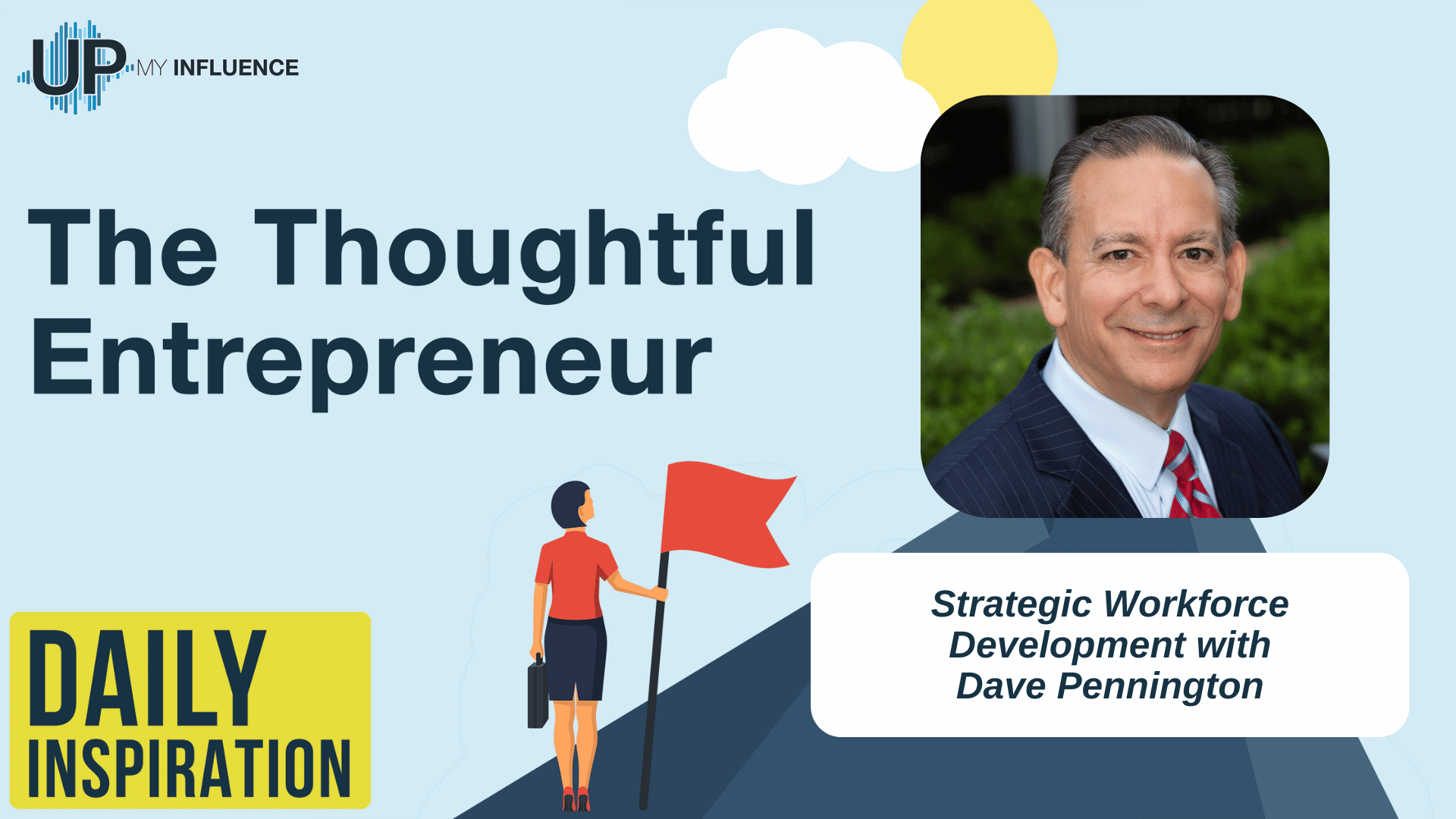THE THOUGHTFUL ENTREPRENEUR PODCAST
In this episode of the Thoughtful Entrepreneur, your host Josh Elledge speaks to the Founder & CEO of Penn Coaching & Consulting, Dave Pennington.

Dave Pennington emphasizes the critical role of focusing on individuals within organizations, observing that enabling employees to excel in their roles can catalyze significant growth across the entire company. He argues that leaders, often overwhelmed by their myriad responsibilities, can benefit from delegating tasks and leveraging the unique strengths of their team members. This approach not only mitigates the risk of leader burnout and inefficiency but also fosters a culture of empowerment that drives business success.
He advocates tailoring business strategies to the unique needs of each organization, sharing the example of a Canadian printing company bogged down by its owner's heavy involvement. By collaborating with Dr. Pennington to reorganize and strategically staff the company, the owner managed to reduce his workload substantially. This change not only revitalized the owner but also set the company on a path to future growth and increased its potential for sale.
Dr. Pennington introduces the metaphor of the ripple effect to describe the impact of leadership development and team building. He compares the process to a pebble thrown into a pond, where the initial impact generates expanding waves. Similarly, positioning the right people in a company can spark exponential growth and success, showcasing the profound influence of effective leadership and a cohesive team structure.
Dr. Pennington's dedication to facilitating business growth and development was evident. He provides an opportunity for a no-obligation consultation call, aiming to explore how his coaching services could meet the specific needs of their businesses. His commitment to offering support and inspiration stands as a guiding light for entrepreneurs navigating the challenges of business expansion.
Key Points from the Episode:
- Importance of focusing on people and helping them thrive within their roles
- Challenges faced by leaders taking on multiple responsibilities
- Delegating and focusing on individual strengths for business growth
- Customizing business strategies to fit unique company needs
- Restructuring and reorganizing for rejuvenation and growth
- Ripple effect of leadership development and team building
- Emphasis on providing guidance and encouragement for business growth
About Dave Pennington:
Dave Pennington is a distinguished figure with a multifaceted career that spans over three decades, embodying roles in pastoral ministry, private education, and the business sector. Adopted at nine months old and raised in Central Florida, Dave's early life was marked by diverse experiences, including playing sports and engaging in various jobs. His academic journey led him to a Christian university in South Carolina, where he earned three degrees: a BA, MA, and PhD, showcasing his dedication to personal and intellectual growth.
Dave is celebrated for his strategic thinking, robust administrative and leadership skills, and exemplary time management abilities. A voracious reader, he has been married for over 40 years, is a father to seven children, and a grandfather to seven. He enjoys sports and delving into construction projects, which reflect his dynamic interests and abilities.
In his professional capacity, Dave founded Penn Coaching & Consulting eight years ago and serves as its CEO. The company is dedicated to aiding businesses in various sectors—from accounting to tech—by integrating the “Strategic Scaling Framework.” This proprietary methodology focuses on hiring, onboarding, developing, and retaining productive employees. With over 35 years of management experience, Dave's passion for leadership development is evident in his commitment to helping business owners and leaders scale their operations effectively. His approach is hands-on as he leans into his clients' challenges, offering guidance and strategies to navigate the complexities of business growth.
About Penn Coaching & Consulting
Penn Coaching & Consulting is dedicated to advancing church leadership and organizational growth through bespoke coaching and consulting services. Leveraging individualized coaching sessions and internationally recognized assessment tools, the firm assists leaders in enhancing clarity, strategizing business progression, and improving life quality. Clients see tangible advancements in their ministries by introducing specific weekly action steps coupled with a supportive accountability framework.
Central to Penn C&C's approach are three guiding philosophies: fostering a dynamic organizational structure, focusing on future-oriented strategies, and recognizing the critical role of personnel in achieving success. The firm advocates for constructing a team of high-caliber, complementary individuals around the founder to avoid growth bottlenecks and facilitate skillful handling of various business aspects.
Moreover, Penn C&C emphasizes incorporating an external perspective to navigate future challenges efficiently, ensuring decisions contribute to long-term growth. Lastly, it champions the idea that the quality of a company's workforce is fundamental to its success, advocating for investment in employee development to foster mutual growth and outperform competitors.
Tweetable Moments:
03:42 – “I'm all about people and leaning in to people because I think often as leaders we don't really value the people that are on our team as much as we should.”
Links Mentioned in this Episode:
Want to learn more? Check out Penn Coaching & Consulting at
Check out Penn Coaching & Consulting on LinkedIn at
https://www.linkedin.com/company/penn-coaching-consulting/
Check out Dave Pennington on LinkedIn at
https://www.linkedin.com/in/david-pennington-phd-35042714/
Check out Dave Pennington on Facebook at
https://www.facebook.com/penncandc
Check out Dave Pennington on Instagram at
https://www.instagram.com/penncandc
Check out Dave Pennington’s free Productive Employee System Checklist
https://penncoaching.com/productive-employee-system-checklist
More from UpMyInfluence:
We are actively booking guests for our The Thoughtful Entrepreneur. Schedule HERE.
Are you a 6-figure consultant? I’ve got high-level intros for you. Learn more here.
What is your #1 Lead Generation BLOCKER? Take my free quiz here.
Want to learn more about all the podcasts managed by UpMyInfluence? Opt in here.

